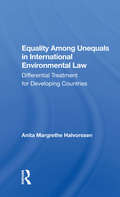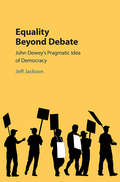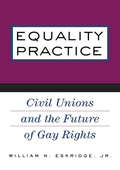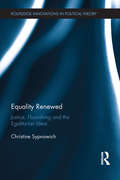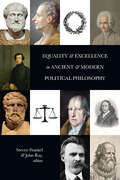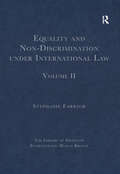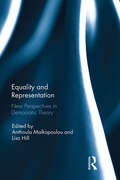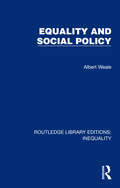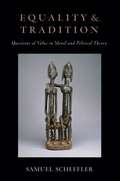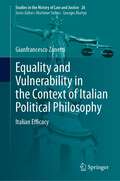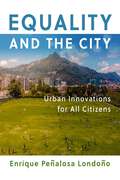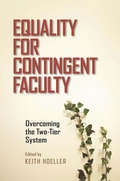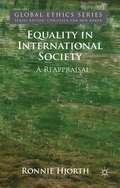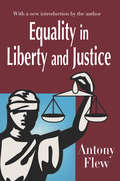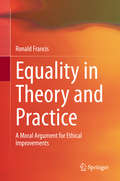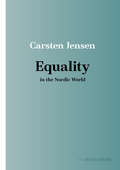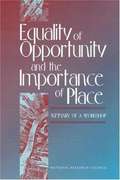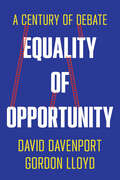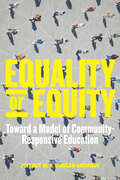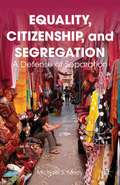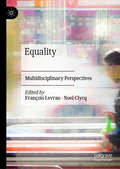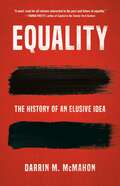- Table View
- List View
Equality Among Unequals In International Environmental Law: Differential Treatment For Developing Countries
by Anita Margrethe HalvorssenThis book provides an examination of the principles of equality and equity in international environmental law. It focuses on analyzing what has been done on the international plane to promote the participation of developing countries in international environmental agreements.
Equality Beyond Debate: John Dewey's Pragmatic Idea of Democracy
by Jeff JacksonWhile many current analyses of democracy focus on creating a more civil, respectful debate among competing political viewpoints, this study argues that the existence of structural social inequality requires us to go beyond the realm of political debate. Challenging prominent contemporary theories of democracy, the author draws on John Dewey to bring the work of combating social inequality into the forefront of democratic thought. Dewey's 'pragmatic' principles are deployed to present democracy as a developing concept constantly confronting unique conditions obstructing its growth. Under structurally unequal social conditions, democracy is thereby seen as demanding the overcoming of this inequality; this inequality corrupts even well-organized forums of political debate, and prevents individuals from governing their everyday lives. Dewey's approach shows that the process of fighting social inequality is uniquely democratic, and he avoids current democratic theory's tendency to abstract from this inequality.
Equality Practice: Civil Unions and the Future of Gay Rights
by William N. Eskridge Jr.William Eskridge, a Yale law professor chronicles the Vermont law which legalised civil unions - distinct from marriage - for same sex couples.
Equality Renewed: Justice, Flourishing and the Egalitarian Ideal (Routledge Innovations in Political Theory)
by Christine SypnowichHow should we approach the daunting task of renewing the ideal of equality? In this book, Christine Sypnowich proposes a theory of equality centred on human flourishing or wellbeing. She argues that egalitarianism should be understood as seeking to make people more equal in the constituents of a good life. Inequality is a social ill because of the damage it does to human flourishing: unequal distribution of wealth can have the effect that some people are poorly housed, badly nourished, ill-educated, unhappy or uncultured, among other things. When we seek to make people more equal our concern is not just resources or property, but how people fare under one distribution or another. Ultimately, the best answer to the question, ‘equality of what?,’ is some conception of flourishing, since whatever policies or principles we adopt, it is flourishing that we hope will be more equal as a result of our endeavours. Sypnowich calls for both retrieval and innovation. What is to be retrieved is the ideal of equality itself, which is often assumed as a background condition of theories of justice, yet at the same time, dismissed as too homogenising, abstract and rigid a criterion for political argument. We must retrieve the ideal of equality as a central political principle. In doing so, she casts doubt on the value of focussing on cultural difference, and rejects the idea of neutrality that dominates contemporary political philosophy in favour of a view of the state as enabling the betterment of its citizens.
Equality and Excellence in Ancient and Modern Political Philosophy
by Steven Frankel; John RayIs it possible to reconcile human excellence with a dedication to equality? Equality and Excellence in Ancient and Modern Political Philosophy explores the meaning, conflict, and potential resolution of the tension between human excellence and equality in the thought of philosophers from Greek antiquity to modern times. Each chapter is devoted to the thought of a particular thinker, and the chapters are arranged chronologically. Interpretations offered here rely on close readings of the major texts by critically important thinkers from Plato, Aristotle and Xenophon in antiquity to a broad range of modern thinkers from Spinoza to Rawls.
Equality and Non-Discrimination under International Law: Volume II (The\library Of Essays On International Human Rights Ser.)
by Stephanie FarriorThe principles of equality and non-discrimination lie at the heart of international human rights law. They are the only human rights explicitly included in the UN Charter and they appear at the beginning of virtually every major human rights instrument. This volume contains selected works by leading authors on the subject of equality and non-discrimination under international law. The selections are grouped into four sections. The first presents essays that explore theoretical concepts of equality and non-discrimination. The next addresses the development of international legal standards on the subject. The third presents articles analyzing how those standards have been interpreted and applied by UN and regional human rights bodies, and the last contains works on what measures besides legal action States are to take to in order to achieve equality and non-discrimination.
Equality and Representation: New Perspectives in Democratic Theory
by Lisa Hill Anthoula MalkopoulouThis volume is primarily concerned with equality as a basic component of the democratic character of representation. In other words, of the many types of equality that have attracted the attention of theorists since democracy’s beginnings – arithmetic equality, equality before the law, equality of opportunity– we would like to draw attention to representational equality, that is, the role of equality in systems of democratic representation. In what form is equality present in traditional forms of electoral representation? How can it be secured in new forms of representation, such as claims-making, deliberative, klerotarian and epistemic representation? And to what extent are electoral or non-electoral models of representation able to accommodate increasing social inequalities? The articles in this volume discuss these issues from a normative and conceptual point of view, seeking to shed new light on the important but under-explored relationship between equality and representation. This book was originally published as a special issue of Critical Review of International Social and Political Philosophy.
Equality and Social Policy (Routledge Library Editions: Inequality #10)
by Albert WealeOriginally published in 1978, this book presents a philosophical analysis of the principle of equality, and is also a study of the institutional implications of that principle in the field of social policy. The author distinguishes between a ‘procedural’ and a ‘substantive’ version of the principle of equality and considers the implications of both. Procedural equality is identified with the concept of equity and includes the recommendation that like cases should be treated as like. The application of this principle to some political argument in the area of social policy, such as family allowances, is discussed. The author defines the substantive principle as the rule that persons should share the same level of economic welfare. Some difficulties in implementing the equal welfare principle are discussed, with particular application to pensions policy. An original interpretation of the logical relationship between the principle of need and that of equality is proposed, and is applied to the case of the health services. The final 2 chapters deal with the institutional implications of the equality principle. These chapters analyse some major political arguments over the organisation of social policy, such as the compatibility of extensive social welfare measures with a market economy.
Equality and Tradition: Questions of Value in Moral and Political Theory
by Samuel SchefflerThis collection of essays by noted philosopher Samuel Scheffler combines discussion of abstract questions in moral and political theory with attention to the normative dimension of current social and political controversies. In addition to chapters on more abstract issues such as the nature ofhuman valuing, the role of partiality in ethics, and the significance of the distinction between doing and allowing, the volume also includes essays on immigration, terrorism, toleration, political equality, and the normative significance of tradition. Uniting the essays is a shared preoccupation with questions about human value and values. The volume opens with an essay that considers the general question of what it is to value something - as opposed, say, to wanting it, wanting to want it, or thinking that it is valuable. Other essays exploreparticular values, such as equality, whose meaning and content are contested. Still others consider the tensions that arise, both within and among individuals, in consequence of the diversity of human values. One of the overarching aims of the book is to illuminate the different ways in whichliberal political theory attempts to resolve conflicts of both of these kinds.
Equality and Vulnerability in the Context of Italian Political Philosophy: Italian Efficacy (Studies in the History of Law and Justice #26)
by Gianfrancesco ZanettiOne of the main goals of this book is to determine if, in the works of some of the key authors in the history of Italian political philosophy, a notion of “efficacy” can be found. In legal philosophy, “efficacy” is the capacity a norm has to effectively influence citizens’ behavior. The “principle of efficacy” is that according to which an order or rule exists as such when it is followed effectively in practice. Here by “efficacy” I mean the idea that normative phenomena are self-justifying, without reference to extrinsic systems of value (such as “natural law”). The examinations of several texts undertaken here constitute reflections on this theme, without any claim to systematicity. They have been grouped together, roughly in historical order, by their common respect for the contexts within which they reason and reach decisions, which lends them a characteristic flavor of harsh realism that at times relies on a minimalist use of traditional normative categories.The second theme that emerges through the respective chapters (each of which constitutes the text for a lesson in a course for Ph.D. students) is that of the relationship between “equality” and “vulnerability.” Here the idea is to elaborate a concept of “vulnerability” that is not underpinned by what we in Italy call an “anthropology,” that is, a fixed notion of human nature. Instead this concept should be comprehensible and graspable solely on the basis of the recognition of decisions and actions that are merely “efficacious,” that function “for what they are, and what they do.” This recognition doesn’t even need to be explicitly articulated by these authors with any specific, deliberately conscious awareness.The goal is not to identify a precise tradition of thought, one which elaborates a given line of reflection, but rather to highlight certain “themes” that emerge in the texts examined, even as the authors write with and for their own specific, contingent set of motives, which differ from time to time and place to place. These authors include some who are widely known, such as Dante, Machiavelli, and Beccaria. At times they are figures who typify certain key historical episodes, such as the Risorgimento (Giuseppe Mazzini) or Fascism (Cesare Lombroso and Santi Romano), while others reflect certain aspects of a contemporary debate (Pasolini and the “Braibanti affair”).The book is based on lectures given for a 2021 Ph.D. Course at the University of California, Berkeley’s Department of Italian Studies.
Equality and the City: Urban Innovations for All Citizens (The City in the Twenty-First Century)
by Enrique Penalosa LondonoIn Equality and the City, Enrique Peñalosa Londoño draws on his experience as mayor of Bogotá, Colombia, as well as his many years of international work as a lecturer and consultant, to share his perspective on the issues facing developing cities, especially sustainable transportation and equal access to public space.As mayor of Bogotá, Peñalosa Londoño initiated development of the TransMilenio Rapid Bus Transit system, among the largest and most comprehensive public transit systems in the Global South, which carries 2.5 million passengers a day along dedicated bus lanes, bike paths, and a rapid metro line. The system emphasizes accessibility for the entire population. Peñalosa Londoño’s efforts to create public space were similarly ambitious: over the course of his two terms, more than a thousand public parks were created or improved. Underlying these policies was a conviction of how cities should be—a compelling humanistic philosophy of sustainable urbanism. For Peñalosa Londoño, city design is not just engineering; it defines human happiness, dignity, and equality. “An advanced city is not one where the poor own a car,” Peñalosa writes, “but one where the rich use public transport.”Equality and the City provides practical criteria for conceiving and constructing different and better cities, describes the obstacles that are confronted when doing so, and identifies ways to overcome them.
Equality for Contingent Faculty: Overcoming the Two-Tier System
by Keith HoellerVice President Joseph Biden has blamed tuition increases on the high salaries of college professors, seemingly unaware of the fact that there are now over one million faculty who earn poverty-level wages teaching off the tenure track. The Chronicle of Higher Education ran a story entitled "From Graduate School to Welfare: The PhD Now Comes with Food Stamps." Today three-fourths of all faculty are characterized as "contingent instructional staff," a nearly tenfold increase from 1975.Equality for Contingent Faculty brings together eleven activists from the United States and Canada to describe the problem, share case histories, and offer concrete solutions. The book begins with three accounts of successful organizing efforts within the two-track system. The second part describes how the two-track system divides the faculty into haves and have-nots and leaves the majority without the benefit of academic freedom or the support of their institutions. The third part offers roadmaps for overcoming the deficiencies of the two-track system and providing equality for all professors, regardless of status or rank.
Equality for Contingent Faculty: Overcoming the Two-Tier System
by Keith HoellerVice President Joseph Biden has blamed tuition increases on the high salaries of college professors, seemingly unaware of the fact that there are now over one million faculty who earn poverty-level wages teaching off the tenure track. The Chronicle of Higher Education ran a story entitled "From Graduate School to Welfare: The PhD Now Comes with Food Stamps." Today three-fourths of all faculty are characterized as "contingent instructional staff," a nearly tenfold increase from 1975. Equality for Contingent Faculty brings together eleven activists from the United States and Canada to describe the problem, share case histories, and offer concrete solutions. The book begins with three accounts of successful organizing efforts within the two-track system. The second part describes how the two-track system divides the faculty into haves and have-nots and leaves the majority without the benefit of academic freedom or the support of their institutions. The third part offers roadmaps for overcoming the deficiencies of the two-track system and providing equality for all professors, regardless of status or rank.
Equality for Inegalitarians
by George SherThis book offers a new and compelling account of distributive justice and its relation to choice. Unlike luck egalitarians, who treat unchosen differences in people's circumstances as sources of unjust inequality to be overcome, Sher views such differences as pervasive and unavoidable features of the human situation. Appealing to an original account of what makes us moral equals, he argues that our interest in successfully negotiating life's ever-shifting contingencies is more basic than our interest in achieving any more specific goals. He argues, also, that the state's obligation to promote this interest supports a principled version of the view that what matters about resources, opportunity, and other secondary goods is only that each person have enough. The book opens up a variety of new questions, and offers a distinctive new perspective for scholars of political theory and political philosophy, and for those interested in distributive justice and luck egalitarianism.
Equality in International Society
by Ronnie HjorthThe author re-examines the concept of equality in international society, past and present. The conventional view that equality of states necessarily flows from sovereignty, that it is a corollary to sovereignty or simply a synonym, is considered a contingent rather than a necessary contention. The main argument is that equality in global international society should be theorised anew, restoring the normative strength of the principle. It is shown how concepts of equality make intelligible different normative and ethical conceptions of the modern political space in the past. Drawing on the works of such diverse theorists as Hans Kelsen, Peter Singer, John Rawls and Michael Oakeshott, the author suggests how a renewed interest in equality contributes to making international society a more inclusive, egalitarian, and credible moral and political association.
Equality in Liberty and Justice
by Antony FlewEquality in Liberty and Justice is an integrated collection of essays in political philosophy, divided into two parts. The first examines (classically) liberal ideas-the ideas of the Founding Fathers of the American republic-and some of the applications and the rejections of such ideas in our contemporary world. Among other questions about liberty and responsibility it considers, in the context of the imprisonment and psychiatric treatment of dissidents in the psychiatric hospitals of the former Soviet Union, Plato's suggestion that all delinquency is an expression of mental disease.The second part examines the relations and the lack of relations between old fashioned, without prefix or suffix, justice and what is called by its promoters social justice. It therefore presses such questions as "Equal outcomes or equal justice?" and "Enemies of poverty or of inequality?"Equality in Liberty and Justice was originally published before the winning of the Cold War and the collapse of the Soviet Empire. This second edition updates the arguments of the previous editor and draws present day moral conclusions. This book will appeal to those for whom the classical liberal and conservative debates still have great meaning. Flew might well be the most significant sunthesizer of Tocqueville and Mill.
Equality in Theory and Practice: A Moral Argument for Ethical Improvements
by Ronald FrancisThis book is an account of the concept of equality from the perspective of both theory and practice, and presents methods of quantifying values. It considers both arguments and evidence, and tackles equality in its different forms, including economic equality, education, equality before the law, equality of opportunity, and gender equality. The book shows that inequality is a profoundly moral question, noting that there are good practical reasons for its adoption. It presents a consideration of classical theories from Aristotle to Hume, as well as contemporary approaches such as those offered by Rawls, Haidt, Temkin, and Parfit. It also contemplates issues such as the naturalistic fallacy, and considers what is different about the Goleman view of moral sensitivity and the ethical personality. The array of evidence includes the impact of climate and various plants such as sugar and cotton on the slave trade, the concept of Gaia, Darwinism, sex inequality, personality, culture, psychological issues, and the quantification of ethics. The book concludes with some practical suggestions for improving equality. It aims to raise awareness of the ways in which equality can be understood, and achieved. It will be relevant to students and scholars in philosophy, human rights, and law.
Equality in the Nordic World (Nordic World)
by Carsten JensenBy most measures, the Nordic countries regularly rank among the best in terms of equality and business friendliness. Political scientist Carsten Jensen delves into what is exceptional about equality in the region, and outlines “the four equalities” that set it apart: economic, intergenerational, gender, and health. The four types of equality have their origins in unique political compromises made in the twentieth century. The resulting social market economies of these countries affect their growth and levels of equality even today.
Equality of Opportunity and the Importance of Place: SUMMARY OF A WORKSHOP
by Joah G. Iannotta Jane L. RossA summary on Equality of Opportunity and the Importance of Place
Equality of Opportunity: A Century of Debate
by Gordon Lloyd David DavenportFor over one hundred years, Americans have debated what equality of opportunity means and the role of government in ensuring it. Are we born with equality of opportunity, and must we thus preserve our innate legal and political freedoms? Or must it be created through laws and policies that smooth out social or economic inequalities? David Davenport and Gordon Lloyd trace the debate as it has evolved from America's founding into the twentieth century, when the question took on greater prominence. The authors use original sources and historical reinterpretations to revisit three great debates and their implications for the discussions today. First, they imagine the Founders, especially James Madison, arguing the case against the Progressives, particularly Woodrow Wilson. Next are two conspicuous public dialogues: Herbert Hoover and Franklin Delano Roosevelt's debate around the latter's New Deal; and Ronald Reagan's response to Lyndon B. Johnson's Great Society and War on Poverty. The conservative-progressive divide in this discussion has persisted, setting the stage for understanding the differing views about equality of opportunity today. The historical debates offer illuminating background for the question: Where do we go from here?
Equality or Equity: Toward a Model of Community-Responsive Education (Race and Education)
by Jeffrey M. Duncan-AndradeEquality or Equity sets forth a compelling argument urging us to shift our understanding of the role of our education system from providing equal opportunity to building an equitable society.A leading scholar-practitioner and ardent proponent of culturally responsive forms of education, Jeffrey M. R. Duncan-Andrade aims to settle the debates over whether we should work toward a public education system built on the goal of equality, in which identical resources are provided for all students, or equity, in which different resources are offered in response to differences in student interests and needs. Duncan-Andrade centers his argument on the importance of creating meaningful education experiences for all students, particularly for low-income students of color and immigrant students, who have gained relatively fewer benefits from decades of equality-focused education reform.Drawing on research from across a range of disciplines, including neuroscience, social epidemiology, public health, and social work, Duncan-Andrade introduces three essential domains of a pedagogy that are both culturally and community responsive: relationships, relevance, and responsibility. He enlists the voices of practitioners to provide grounded examples of what community-responsive pedagogy looks like in each of these domains. These examples demonstrate how equitable classroom practices can enrich student engagement, enhance trauma responsiveness, and improve educational outcomes.Equality or Equity makes an urgent appeal for designing and implementing a truly equitable school system and shows us how we can begin to accomplish that goal.
Equality within Our Lifetimes: How Laws and Policies Can Close—or Widen—Gender Gaps in Economies Worldwide
by Jody Heymann Aleta Sprague Amy RaubA free ebook version of this title is available through Luminos, University of California Press’s Open Access publishing program. Visit www.luminosoa.org to learn more. Well into the twenty-first century, achieving gender equality in the economy remains unfinished business. Worldwide, women’s employment, income, and leadership opportunities lag men’s. Building and using a one-of-a-kind database that covers 193 countries, this book systematically analyzes how far we’ve come and how far we have to go in adopting evidence-based solutions to close the gaps. Spanning topics including girls’ education, employment discrimination of all kinds, sexual harassment, and caregiving needs across the life course, the authors bring the findings to life through global maps, stories of laws’ impact in courts and beyond, and case studies of making change. A powerful call to action, Equality within Our Lifetimes reveals how gender equality is both feasible and urgently needed to address some of the greatest challenges of our generation.
Equality, Citizenship, and Segregation: A Defense of Separation
by Michael S. MerryMerry argues that most voluntary separation experiments in education are not driven by a sense of racial, cultural or religious superiority. Rather, they are driven among other things by a desire for quality education, not to mention community membership and self respect.
Equality: Multidisciplinary Perspectives (Routledge Research In Educational Equality And Diversity Ser.)
by Noel Clycq François Levrau‘Equality’ as an ideal has a long history, and while some progress has obviously been made, the persistence of certain inequalities is remarkable. In order to draw a detailed picture of equality’s nature, value, relevance, and scope, this book provides a multidisciplinary analysis. Using a classic three part framework, the book looks at the macro level (broader systemic, historical, conceptual, societal and European level), the meso level (concrete social institutions such as the labour market and the welfare state) and the micro level of the individuals and their relations and thoughts about equality (psychological reactions, cultural depictions and sociological analyses). The chapters not only provide an overview of the state of equality, but also identify promising areas of future research, and will be of interest to students and scholars across a number of fields including European studies, history, law, political philosophy, psychology, sociology and economics.
Equality: The History of an Elusive Idea
by Darrin M. McMahonThe definitive history of the idea of equality—and why we&’re so ambivalent about it Equality is in crisis. Our world is filled with soaring inequalities, spanning wealth, race, identity, and nationality. Yet how can we strive for equality if we don&’t understand it? As much as we have struggled for equality, we have always been profoundly skeptical about it. How much do we want, and for whom? Darrin M. McMahon&’s Equality is the definitive intellectual history, tracing equality&’s global origins and spread from the dawn of humanity through the Enlightenment to today. Equality has been reimagined continually, in the great world religions and the politics of the ancient world, by revolutionaries and socialists, Nazis and fascists, and postwar reformers and activists. A magisterial exploration of why equality matters and why we continue to reimagine it, Equality offers all the tools to rethink equality anew for our own age.
